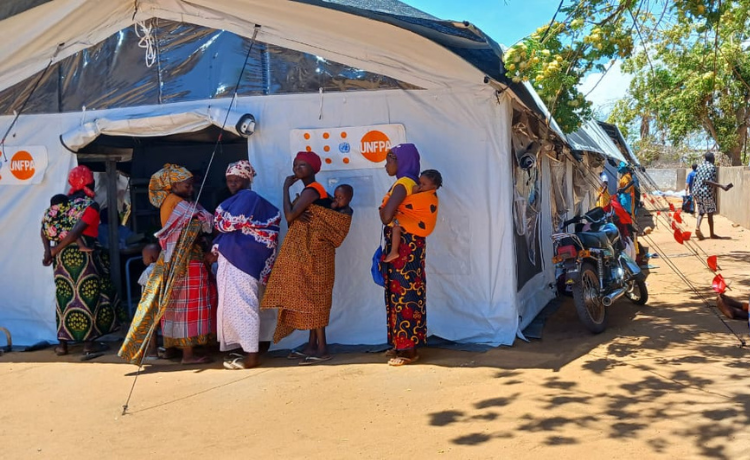News
“This support gives us hope”: A journey to motherhood in the midst of Tropical Cyclone Chido
- 20 January 2025
News
CABO DELGADO PROVINCE, Mozambique – When Tropical Cyclone Chido tore through northern Mozambique in December 2024, 26-year-old Massiala Agostinho was eight months pregnant with her fifth child.
Like almost all others in her village of Sambene, in the Mecufi District of Cabo Delgado Province, Ms. Agostinho’s home was quickly reduced to rubble by powerful winds and torrential rains. For nearly a month now she has been staying in a cramped shelter with her husband and four children, hoping to give birth safely in a functioning health facility.
When the cyclone hit, Ms. Agostinho had been on a training programme to become a community health worker, nearby in the provincial capital Pemba – which was also heavily affected. Returning to Sambene, she found her family uprooted.
“I couldn’t believe my eyes,” she told UNFPA, the United Nations sexual and reproductive health agency. “Everything was gone. My sweet home, where I felt safe, was no more.”
The local hospital was severely damaged, so Ms. Agostinho had to travel by rowboat to the district Mecufi Health Centre for antenatal care, enduring back pain and fatigue as her pregnancy progressed. More than 50 health facilities are reported to be completely or partially inoperable due to cyclone destruction and destroyed medical supplies.
Gaps in critical support
![A woman stands in front of a makeshift shelter]](/sites/default/files/inline-images/mozambique.png)
Tropical Cyclone Chido is estimated to have killed 120 people and affected over 450,000. A lack of shelter, food shortages and the need for long-term medical and psychosocial support are some of the key priorities for recovery; yet with more than 40 per cent of hospitals damaged, UNFPA estimates that more than 12,000 pregnant women have been left with even more scarce access to healthcare.
In Cabo Delgado Province, only four of the ten UNFPA-supported women and girls’s safe spaces and referral health facilities are currently operational, drastically reducing the options for survivors of gender-based violence and those at risk to seek help – just as the risks are rising.
Cecília Wachave, a 45-year-old mother of two daughters from Wiyeweya Village in Mecufi, told UNFPA, “I wished the night wouldn’t come again, because I didn’t know what could happen while we’re sleeping under the tree without light.”
UNFPA is striving to ensure essential sexual and reproductive health and gender-based violence response services for over 60,000 women and girls in affected communities. Mobile and temporary safe spaces have been set up to provide immediate shelter and support, and gender-based violence awareness and protection measures were swiftly launched among communities as well as at food and water distributions, where women and girls are all too often abused, exploited and assaulted.

In partnership with provincial health services, family planning advice is being tailored to people in crises, emergency temporary medical services have been set up in specially equipped tents, and kits containing sanitary supplies, underwear and other essentials are being distributed. A mobile clinic has also been deployed in Mecufi to ensure pregnant women can receive critical prenatal and obstetric care.
“This support gives us hope,” says Ms. Agostinho. “It shows us we are not alone.”
Resilience in the face of adversity
For pregnant women in Sambene and beyond, the lack of immediate access to maternal health services can be life threatening. Many were already grappling with the challenges of forced displacement in Cabo Delgado’s years-long conflict, with this latest disaster adding a new layer of suffering.
Adding to the difficulties in ensuring health access, the province is beset by shortages of skilled health workers, a gap UNFPA is working to fill by training nurses and midwives and supporting their deployment to hard-to-reach areas. The UNFPA-supported Mecufi Health Centre where Ms. Agostinho sought help has provided a lifeline for countless other pregnant women, but its resources are stretched thin and greater support is urgently needed.
Together with the Government of Mozambique, UNFPA is calling for $7.2 million to support women and girls affected by Cyclone Chido.